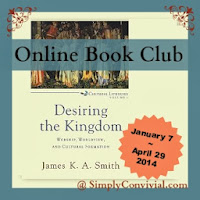
We are five weeks in and have made it to chapter 2 of Desiring the Kingdom in our book club. I think we are ALMOST out of the definition stage. Although when I went to get the amazon link I was reminded that book two in the series is about how worship works - so this book might be mostly definition. See what others have to say at Simply Convivial.
Smith begins by discussing the movie Moulin Rouge as his example of loves in conflict. I saw it in the theater and almost walked out after the first 15 minutes because of the crazy videography at the beginning. I do love the movie though. I think his discussion of it points to why I enjoyed it – you want love to win. He highlights one of the issues I currently struggle with when he says that Christian’s father berates the culture because of “its sinfulness, which seems most linked to its failure to be ‘productive’.” I am trying to fight that same perception and move away from productivity and "doing good" as the measure of a man.
Reading Smith’s discussion of aiming our loves tied in well with James Daniels and Cindy Rollins What are we doing to our Boys? discussion. Smith asserts that Christian culture tries to suppress
our loves when really our call should be to channel our loves. He puts it this way, we must admit, “that we
are creatures primarily of love and desire – and then respond in kind with
measures that focus on our passions, not primarily on our thoughts or
beliefs?” This is exactly what the article discusses with a classical bent. Daniels' used the word “thumos”. So I looked it up and found the article Got Thumos? by Brett and Kate McKay. Basically it is impossible to directly bring this concept into our language because we don't have any close equivalent in our culture. Thus the need for a long article with great examples from Plato and classic stories that I just can't quote here. Here are some of the functions of thumos (from the McKay's article):
- the source of the emotion and the emotion itself
- blazes with manliness in anticipation of the fight
- it's courage and steadfastness, fearless indomitability
- it's the place where you ponder possibilities and it's related to gut feelings and intuition
- desire to dominate, to be the best of the best
in the end they say "perhaps the best and simplest definition I've come across is 'energetic thinking leading to action'. Can't you see your little boy doing that right now - if you don't stop him first! The rest of the article discusses what happens when the thumos isn't rightly aligned and how it can be shaped and brought to it's full potential (my kids favorite term - thanks Ninjago).
So, first steps require realizing the feelings that you are dealing with. Honestly, I tend to donwplay emotions because so often our culture tries to use them as the driver instead of part of a team. After reading the book How We Love, I realize that I haven't let emotions play the role that they should be playing. Taking the online test (I'm not a huge advocate of these types of tests, in general, but my friends and I have found it instructive) helped me realize just how out of touch I am with some things. Mentors have been trying to show me for years - but I am a slow learner. My emotional understanding and health is essential if I am going to raise healthy young men. If I can't recognize and deal with my own emotions - how can I help them with theirs? Anger and frustration cannot be my primary "go to" emotions. I need to find some other modes of expression. Smith is right - we need to help direct our passions. I think this concept of thumos is a better way to understand and nurture the emotions of our boys in a way that is more fitting to their nature and loves. Much better than our typical "I'm okay, You're okay" paradigm. I am just beginning to consider these ideas.
These are the primary thoughts that stuck out for me from the chapter. He does talk about habits but in the fall I read The Power of Habit which talks about thick and thin habits. Smith posits that some of these habits could even be considered liturgies. He does this in an effort to shake up our understanding of the idea and to give greater weight to the unseen impact of our cultural "norms". At one point he made me think about the current move back to local, organic produce - away from the big stores. This change reflects a different value in food, community and culture. Going to the local produce stand is a different experience than running into Walmart. I think this is the type of idea he is trying to help us consider.

That word "thumos" is really interesting! Especially in connection with raising boys. Something to think about.
ReplyDeleteThanks for linking that article. I've only had time to skim so far, but I'm looking forward to reading it when I have quiet so I can take it in.
ReplyDeleteThat quiz was really interesting. I am a sucker for quizzes. :)
ReplyDeleteThis chapter reminded me of Power of Habit, also. I think it is the reward part of the habit cycle that affects the thickness: what is the reward we are getting from it, what does it give us? When we really start looking deeper, the reward of a thick habit is an identity we want.